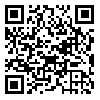Volume 5, Issue 1 (5-2021)
J Social Behav Communit Health 2021, 5(1): 652-664 |
Back to browse issues page
Download citation:
BibTeX | RIS | EndNote | Medlars | ProCite | Reference Manager | RefWorks
Send citation to:



BibTeX | RIS | EndNote | Medlars | ProCite | Reference Manager | RefWorks
Send citation to:
Lamyian M, Ahmadi F, Sheikholeslami H. Role of Clergywomen in Promoting Preventive Breast Cancer Behaviors Among Muslim Women in Iran: A Qualitative Study. J Social Behav Communit Health 2021; 5 (1) :652-664
URL: http://sbrh.ssu.ac.ir/article-1-133-en.html
URL: http://sbrh.ssu.ac.ir/article-1-133-en.html
1- Department of Reproductive Health & Midwifery, Faculty of Medical Sciences, Tarbiat Modares University, Tehran, Iran. , lamyianm@modares.ac.ir
2- Department of Nursing, Tarbiat Modares University, Tehran, Iran.
3- Department of Anthropology and Sociology, Denison University, Granville, Ohio, USA.
2- Department of Nursing, Tarbiat Modares University, Tehran, Iran.
3- Department of Anthropology and Sociology, Denison University, Granville, Ohio, USA.
Abstract: (1719 Views)
Background: The purpose of this qualitative study is to explore Iranian women’s perceptions, behaviors, and beliefs related to breast cancer screening readiness, with a focus on the role of religion.
Methods: Our sample consisted of 25 women, 35 to 65 years old, who resided in Tehran, Iran. It included 15 at-risk women (self-reported history of breast cancer before the age of 40 in their family) and 10 others with a history of breast cancer. All interviewees were Muslim who spoke Persian (Farsi). The women were chosen using purposive sampling. We used a qualitative content analysis design with a constant comparative analysis approach, which is appropriate for obtaining reliable and valid results from textual data.
Results: The overarching theme apparent from transcript analysis was that of “Clergywoman Can Play a Role in Increasing Awareness”. Four categories, namely, (1) Lack of information regarding breast cancer screening, (2) Awareness can improve self-care, (3) Religious outlooks of participants can influence early detection behaviors, (4) Clergywoman can play a role in increasing awareness, were identified. However, we found that the majority of interviewees lacked information about breast cancer screening and prevention. This was often both the cause and the effect of fear and misunderstandings about the process. Furthermore, we found that religious authorities, particularly clergywomen, who speak from a religious perspective, could play a significant and effective role in convincing women to pursue prevention measures. Additionally, we found that many women emphasized that religious gatherings, or framing health messages in a religious narrative, could be a significant step forward in advocating early detection behaviors.
Conclusion: Our study shows that religion is a motivating factor in breast cancer early detection behavior and offers new insight into women’s perceptions of self-care. It highlights a potentially significant role of clergywomen in encouraging women in Tehran, Iran to pursue breast cancer screening.
Methods: Our sample consisted of 25 women, 35 to 65 years old, who resided in Tehran, Iran. It included 15 at-risk women (self-reported history of breast cancer before the age of 40 in their family) and 10 others with a history of breast cancer. All interviewees were Muslim who spoke Persian (Farsi). The women were chosen using purposive sampling. We used a qualitative content analysis design with a constant comparative analysis approach, which is appropriate for obtaining reliable and valid results from textual data.
Results: The overarching theme apparent from transcript analysis was that of “Clergywoman Can Play a Role in Increasing Awareness”. Four categories, namely, (1) Lack of information regarding breast cancer screening, (2) Awareness can improve self-care, (3) Religious outlooks of participants can influence early detection behaviors, (4) Clergywoman can play a role in increasing awareness, were identified. However, we found that the majority of interviewees lacked information about breast cancer screening and prevention. This was often both the cause and the effect of fear and misunderstandings about the process. Furthermore, we found that religious authorities, particularly clergywomen, who speak from a religious perspective, could play a significant and effective role in convincing women to pursue prevention measures. Additionally, we found that many women emphasized that religious gatherings, or framing health messages in a religious narrative, could be a significant step forward in advocating early detection behaviors.
Conclusion: Our study shows that religion is a motivating factor in breast cancer early detection behavior and offers new insight into women’s perceptions of self-care. It highlights a potentially significant role of clergywomen in encouraging women in Tehran, Iran to pursue breast cancer screening.
Type of Study: Original Article |
Subject:
Education & Health
Received: 2020/01/4 | Accepted: 2021/03/14 | Published: 2021/05/20
Received: 2020/01/4 | Accepted: 2021/03/14 | Published: 2021/05/20
Send email to the article author
| Rights and permissions | |
 |
This work is licensed under a Creative Commons Attribution-NonCommercial 4.0 International License. |








